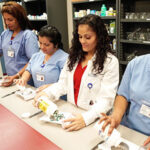
This holiday season, perhaps the greatest gift for frontline workers and healthcare professionals would be to receive a vaccine for COVID-19. Thankfully, due to the diligence and hard work of scientists around the globe, there are now multiple COVID-19 vaccines available and slowly being distributed to Americans. FVI School of Nursing and Technology has compiled a list of some of the most pressing questions about the three types of COVID-19 vaccines. If you are healthcare worker or currently working in the frontlines fighting this pandemic, learn how you can qualify and receive a vaccine sooner rather than later.
How Does The Pfizer COVID-19 Vaccine Work?
Manufactured by Pfizer, Inc. and BioNTech, the Pfizer-BioNTech vaccine for COVID-19 is a mRNA vaccine. A new type of vaccine designed to protect against infectious diseases without containing trace amounts of the coronavirus. mRNA vaccines teach cells in the body how to make certain proteins or pieces of protein which trigger an immune response. This immune response includes making antibodies which protects the body from getting infected by the coronavirus. The Pfizer COVID-19 vaccine is administered with two shots to the upper arm given 21 days apart.
This vaccine needs to be stored in dry ice (short-term) and specialized freezers (long-term) at –70° Celsius. In clinical trials, the vaccine was found to be 95% effective at preventing COVID-19 illness. 1 The U.S. Food and Drug Administration (FDA) issued emergency use authorization of the Pfizer-BioNTech vaccine on December 11, 2020. 2
How Does The Moderna COVID-19 Vaccine Work?
Manufactured by Massachusetts-based biotechnology company Moderna, the Moderna vaccine for COVID-19 is also a mRNA vaccine. That means the vaccine does not contain trace amounts of the coronavirus and cannot cause infection. Instead, the vaccine uses a piece of genetic code to train the immune system how to react against the SARS-CoV-2 coronavirus and produce antibodies effectively. Like the Pfizer vaccine, the Moderna vaccine also requires two shots: a priming dose follow by a booster shot 28 days later.
The vaccine needs to be stored between -25°C and -15°C inside a regular freezer. This more average temperature and its 30-day shelf life when stored in a refrigerator means the Moderna vaccine is likely easier to distribute than the Pfizer vaccine. In clinical trials, the vaccine was found to have 94% efficacy. An analysis by the FDA affirmed those findings. The agency issued emergency use authorization of the Moderna vaccine on December 18, 2020. 3
How Does The AstraZeneca COVID-19 Vaccine Work?
Developed by AstraZeneca and Oxford University, the Oxford-AstraZeneca vaccine is a more traditional vaccine. Unlike the mRNA vaccines developed by Moderna and Pfizer, this vaccine involves an inactivated common cold virus altered with genes to express the spike protein of the SARS-CoV-2 virus. Cells in the body are then taught how to effectively react to the virus and make antibodies to prevent illness.
When injected, the vaccine induces an immune response that protects the patient against the COVID-19 disease. Advanced clinical trails found the Oxford-AstraZeneca vaccine had up to 90% overall efficacy. 4 According to those trials, the most effective dosage, at around 90% efficacy, involved two shots: a half dose followed by a full dose four weeks later. 5 The FDA has yet to authorize the use of the Oxford-AstraZeneca vaccine. As a result, healthcare professionals and frontline workers in America will likely receive either the Pfizer-BioNTech vaccine or the Moderna vaccine instead.
Who Gets The COVID-19 Vaccine First?
COVID-19 vaccine distribution in the United States will be done in phases due to the limited supply currently available. The Advisory Committee on Immunization Practices (ACIP) at the U.S Centers for Disease Control and Prevention (CDC) recommended that health care personnel and residents of long-term care facilities receive vaccination first in the initial phase, “Phase 1a.” 6 For “Phase 1b,” a panel of vaccine advisors at the CDC voted to recommend both older adults aged 75 and older as well as “frontline essential workers” would be the second group to receive the vaccine. People ages 16 to 64 with high-risk medical conditions and “other essential workers” would receive the vaccine during “Phase 1c.” 7
Thank You To Healthcare Workers Fighting The COVID-19 Pandemic!
As a healthcare vocational school in Miramar, FVI School of Nursing and Technology is training the next generation of healthcare workers and essential frontlines. We would like to take a moment to say – Thank You Healthcare Workers! Thank you to the doctors, nurses, medical assistants, nursing assistants, pharmacists, pharmacy technicians, and all other healthcare professionals and medical facility workers doing their part to fight COVID-19. Hopefully, some of you will receive a COVID-19 vaccine as a gift this holiday season!
Sources
- Centers for Disease Control and Prevention – The Advisory Committee on Immunization Practices’ Interim Recommendation for Use of Pfizer-BioNTech COVID-19 Vaccine — United States, December 2020
- U.S. Food and Drug Administration – FDA Takes Key Action in Fight Against COVID-19 By Issuing Emergency Use Authorization for First COVID-19 Vaccine
- Metthew Herper, STAT – FDA grants authorization to Moderna’s Covid-19 vaccine, the second in the U.S.
- Jenny Strasburg & Joseph Walker, The Wall Street Journal – AstraZeneca, Oxford COVID-19 vaccine up to 90% effective in late-stage trials
- Michelle Roberst, BBC – Oxford/AstraZeneca Covid vaccine ‘dose error’ explained
- Centers for Disease Control and Prevention – The Advisory Committee on Immunization Practices’ Interim Recommendation for Allocating Initial Supplies of COVID-19 Vaccine — United States, 2020
- Jacqueline Howard & Jen Christensen, CNN – Who gets Covid-19 vaccine next? Older adults and ‘frontline essential workers,’ CDC advisers recommend








